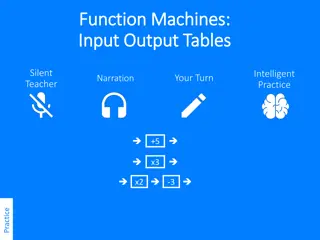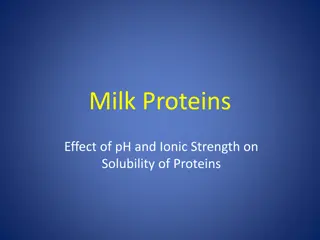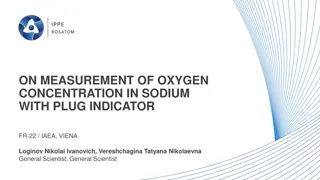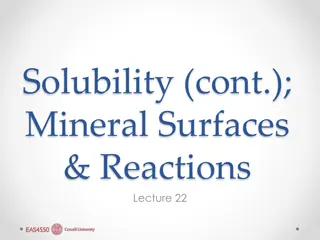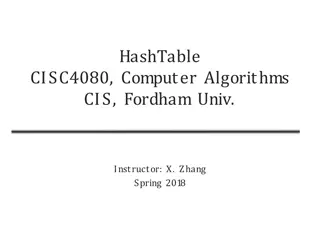Understanding Solutions and Precipitation Reactions
Solutions are classified as saturated, unsaturated, or supersaturated based on the concentration of solute in the solvent. Solubility plays a critical role in determining the amount of solute that can be dissolved in a solvent at a given temperature. Reactions yielding products of limited solubility
6 views • 10 slides
If you are looking for Grazing Tables in Netley
If you are looking for Grazing Tables in Netley, Event Gourmet and Florals provide grazing tables, platters, dessert bars, cocktail food and florals for corporate functions, weddings, engagements, family events, parties and more! Whether you\u2019re hosting an event at your home, workplace, favourit
0 views • 6 slides
Weapons Training Strategies and Crew Gunnery Tables Overview
This article provides an in-depth look at the mounted machine gun gunnery gates and tables, crew gunnery progression, weapons training strategy, training gates, and crew gunnery tables. It outlines the structured approach to attaining and sustaining direct fire proficiency for various weapon systems
1 views • 16 slides
Maintaining an Operating Table: Principles and Functions
An operating table system comprises three components - the table column, table top, and transporter, each available in different versions for various surgical disciplines. Stationary tables are anchored to the floor, offering flexibility to adapt to patient needs. Mobile tables provide maneuverabili
0 views • 12 slides
Understanding Solubility of Organic Compounds
A solution is a homogeneous mixture composed of a solute dissolved in a solvent. Solubility refers to the ability of one compound to dissolve in another. The solubility of organic compounds can be categorized based on chemical reactions like acid-base interactions. Different methods such as gravity
0 views • 6 slides
Year 4 Multiplication Tables Check (MTC) 2022 Information
The Year 4 Multiplication Tables Check (MTC) in 2022 assesses children's fluency in recalling multiplication tables. It helps schools identify students needing additional support. The check will occur between June 6th and June 24th, 2022. It is digital and children have 6 seconds to answer each ques
0 views • 9 slides
Understanding Equivalent Ratios and Tables in Math
Learn how to write equivalent ratios, determine unknown terms in ratios and tables, plot equivalent ratios on a coordinate plane, and understand key vocabulary related to ratios such as ratio tables, scaling up/down, and coordinate planes. Discover how equivalent ratios are formed by scaling up or d
0 views • 28 slides
Importance of Times Tables and the Multiplication Tables Check for Children
Times tables play a crucial role in supporting children's mathematical foundation, essential for their future academic success. Understanding the significance of multiplication facts up to 12x12 is emphasized, aiding proficiency in later years. The Multiplication Tables Check, conducted digitally, e
1 views • 18 slides
Mechanism of General Anaesthesia Theories: Lipid Solubility, Surface Tension, Microcrystal, Protein Binding
Mechanism of general anaesthesia involves theories focusing on the interaction of anaesthetics with cell membrane components like lipids and proteins. The Lipid Solubility theory emphasizes the importance of an anaesthetic's affinity and solubility in nerve cell membranes, while the Surface Tension
1 views • 10 slides
Introduction to Function Machines and Input-Output Tables
Explore the concept of function machines and input-output tables through silent teacher-led practice sessions. Engage in intelligent exercises to strengthen your understanding. Work on completing tables and solving equations with step-by-step examples provided. Enhance your skills in identifying pat
1 views • 4 slides
Understanding Physicochemical Properties of Drugs
The physicochemical properties of drugs play a crucial role in their pharmacological effects. These properties include physical and chemical characteristics that influence interactions with biomolecules. Solubility, partition coefficient, and dissociation constant are key factors affecting drug beha
1 views • 46 slides
Free Science Education Resources on Science Prof Online (SPO)
Science Prof Online (SPO) is a valuable free science education website offering fully-developed Virtual Science Classrooms, science-related PowerPoints, articles, and images. It serves as a comprehensive resource for students, educators, and anyone interested in science. Explore practice test questi
0 views • 17 slides
Solubility Rules from the University of South Carolina
This resource outlines the solubility rules for various compounds based on their chemical properties. It explains the solubility of compounds of alkali metals, ammonium salts, nitrates, chlorides, sulfates, and more. The rules provide insights into which compounds are soluble or insoluble in aqueous
1 views • 10 slides
Experimenting with Supersaturated Solutions: Rock Candy Creation
Exploring the phenomenon of supersaturated solutions through an experiment creating rock candy. The solubility of sucrose in water is observed at different temperatures, showcasing how more sugar can dissolve in a hot solution than in a cold one. The process of supersaturation and crystallization is
0 views • 11 slides
Pharmaceutical Dosage Form Design and Drug Delivery Systems Overview
Understanding pH-solubility profiles of drugs like indomethacin, chlorpromazine, and oxytetracycline is crucial in formulating pharmaceuticals. Factors affecting dissolution rates, such as particle size and solubility, can be optimized to enhance drug absorption. Different methods like particle size
0 views • 46 slides
Understanding Protein Solubility: Effects of pH, Ionic Strength, and Salting Out
Exploring the factors influencing the solubility of proteins, including pH levels, ionic strength, and salting out techniques. This study delves into the isoelectric point of proteins and the impact of salt addition on solubility, aiming to enhance comprehension in the field of protein biochemistry
0 views • 14 slides
Understanding Solutions and Solubility in Chemistry
Explore the concepts of solutions, solvents, solutes, and solubility in chemistry through investigations with various substances and solvents. Learn how to differentiate between dilute, concentrated, and saturated solutions, measure solubility, create solubility curves, and understand crystallizatio
0 views • 36 slides
Understanding the Multiplication Tables Check (MTC) for Year 4 Students
The Multiplication Tables Check (MTC) is a statutory assessment for Year 4 pupils aimed at testing their fluency in times tables up to 12. With 25 questions, students have 6 seconds per question to recall answers. The MTC helps schools identify areas for additional support, with an optimal aim of 88
0 views • 7 slides
Understanding Solubility: Applications and Experiments
Solubility plays a crucial role in various applications such as cleaning, separation, and identification. This content explores how solubility works with practical examples using magnets and marbles to illustrate the concept. Discover the differences between polar and non-polar compounds through han
0 views • 40 slides
Guide to Recrystallization Techniques for Purifying Solid Organic Compounds
Solid organic compounds obtained from organic reactions are often impure and require purification through recrystallization. This process involves choosing a suitable solvent, testing solubility, and using decolorizing charcoal to remove impurities. Proper solvent selection is crucial for successful
0 views • 13 slides
Measurement of Oxygen Concentration in Sodium with Plug Indicator FR-22
Determining oxygen concentration in sodium using plug indicators is crucial for experimental facilities and nuclear reactors. This involves lowering sodium temperature slowly until sodium oxide crystallization begins, indicating saturation temperature (TS). Several solubility equations exist for cal
0 views • 6 slides
Understanding Solubility, Polarity, and Cleaning in Chemistry
Explore the concepts of solubility in different solvents, the role of polarity in dissolving compounds, and how cleaning agents work based on their polar or nonpolar nature. Discover how soap molecules form micelles to remove stains effectively, and learn about emulsions like mayonnaise where oil an
0 views • 18 slides
Understanding Descriptor Tables and Registers in Computer Systems
Descriptor tables in computer systems group segment descriptors together for efficient memory management. They consist of Global Descriptor Table (GDT), Local Descriptor Table (LDT), and Interrupt Descriptor Table (IDT). The Global Descriptor Table (GDT) is a crucial table that is shared by all prog
0 views • 18 slides
Protein Isolation Techniques: Salting In and Salting Out
Proteins exhibit varying solubility based on salt concentrations, with salting in increasing solubility and salting out causing precipitation. This practical involves isolating lactate dehydrogenase enzyme using salting in, salting out, and dialysis techniques, as well as assessing purity through ac
0 views • 19 slides
Understanding Mixtures: Solutions, Colloidal Dispersions, and Suspensions
Food mixtures can be classified based on particle size distribution, with the dispersed phase scattered throughout a continuous medium. Solutions, a type of mixture, consist of a solute (dispersed phase) and a solvent (continuous phase), forming a homogenous blend. Factors like temperature, particle
0 views • 80 slides
Understanding Substances, Mixtures, and Solubility in Physical Science
Explore the concepts of substances, mixtures, and solubility in Physical Science with a detailed explanation of solutions, types of mixtures, and the importance of understanding these in everyday life. Discover the differences between atoms, elements, pure substances, and mixtures, and learn about h
0 views • 81 slides
Understanding Logic Problems and Truth Tables
Explore the process of solving logic problems using truth tables, from defining the problem to implementing solutions in hardware and software. Learn to identify inputs and outputs, select appropriate truth tables, fill in truth tables, document solutions, and simplify solutions using Boolean Algebr
0 views • 16 slides
Understanding Trace Tables for Algorithm Testing
Trace tables are a valuable technique used to test algorithms step by step and identify logic errors. They involve using truth tables to track variable values or conditions. This content provides insights into trace tables, correcting errors in pseudocode, using examples for variable tracking, and c
0 views • 9 slides
Understanding Ocular Pharmacology: General Principles and Drug Delivery
The study of ocular pharmacology involves understanding general pharmacological principles, pharmacodynamics, and pharmacokinetics. Drugs can be delivered to ocular tissue locally via eye drops, ointments, injections, or systemically through oral or intravenous routes. Factors such as drug concentra
0 views • 58 slides
Understanding Concentration and Solubility in Solutions
This content covers topics related to concentration and solubility in solutions, including calculating concentration, determining solubility, and comparing different solution properties based on concentration levels. It also includes examples and explanations to help understand these concepts better
0 views • 6 slides
Understanding Precipitation Reactions in Analytical Chemistry
Precipitation reactions play a crucial role in analytical chemistry, where cations and anions combine to form insoluble solids called precipitates. By following solubility rules, scientists can predict these reactions, aiding in identifying ions present in solutions. Properties, formation, and equil
0 views • 17 slides
Recent Advances in FEVE Fluoropolymer Resin Technology
Recent discoveries in FEVE technology showcase the impressive properties of Fluoroethylene Vinyl Ether (FEVE) resins, such as weatherability, chemical resistance, gloss, solubility, and crosslinking. These resins offer ambient cure for field applications, OH functionality for crosslinking, solvent s
0 views • 25 slides
Understanding Solubility and Mineral Reactions in Geology
Exploring the complexities of solubility in minerals such as silica, hydroxides, and ferric iron, this informative lecture delves into stability diagrams and the impact of pH on mineral dissolution. Various reactions, equilibrium expressions, and the role of hydroxides in controlling metal solubilit
0 views • 18 slides
Understanding Solubility Product Constant for Slightly Soluble Salts
Solubility product constant (Ksp) is a special constant that describes the solubility of slightly soluble salts like potassium acid tartrate (KHT) and silver chloride (AgCl) in solution. This experiment aims to determine Ksp for KHT and explore factors affecting Ksp such as temperature and common io
0 views • 13 slides
Understanding Life Tables: Essential Tools in Demographic Analysis
Life tables are crucial tools in demography for analyzing mortality patterns and calculating life expectancy. They summarize mortality experiences of cohorts, provide insights on survival probabilities, and help estimate life expectancies for different populations. By constructing cohort and period
0 views • 31 slides
Understanding Hash Tables and Hashing Concepts in Computer Algorithms
This content delves into the concept of Hash Tables, covering topics such as the support for dictionary operations, achieving constant time through direct address tables, case studies in web server maintenance, and an exploration of hashing functions and collision avoidance. It also touches upon key
0 views • 40 slides
Understanding Solutions and Solubility through Experiments
Explore the concept of solutions and solubility through various investigations and experiments. Learn about solvents, solutes, and solutions, and discover how temperature affects solubility. Use the particle model to explain the process of dissolving and understand the properties of saturated soluti
0 views • 10 slides
Overview of Physical Flow Accounts and Supply-Use Tables in Economic Analysis
Physical flow accounts play a crucial role in understanding the movement of resources between the environment and the economy. The seminar discussed the scope, purpose, and formation of physical flow accounts based on monetary supply and use tables. It highlighted the importance of widening the dime
0 views • 11 slides
Chemistry Study Materials and Practice Questions
This collection of chemistry study materials includes information on reactions, solubility, electrolytes, and solution stoichiometry. Practice questions cover classifying solutes, predicting solubility of salts, writing ions produced in water, and determining precipitates in reactions. Includes a mo
0 views • 15 slides
System of Environmental-Economic Accounting Core Tables for Water
System of Environmental-Economic Accounting (SEEA) provides core tables and accounts focusing on water accounting and other environmental aspects. The core tables offer concise and relevant information essential for deriving indicators and formulating evidence-based public policies. These tables aim
0 views • 15 slides









